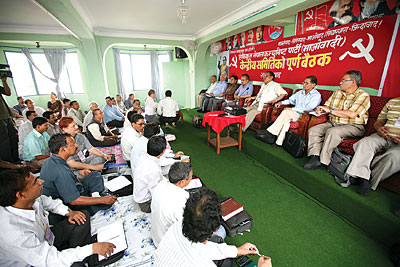 KIRAN PANDAY |
The ongoing Maoist Central Committee (CC) meeting, and the extended one scheduled for next month, will decide whether Nepal will get a constitution through this CA.
The last extended CC at Kharipati in December 2008 put the Maoists on a confrontational path. The party decided to consciously sharpen the polarisation with 'India and domestic comprador, bureaucratic capitalists and feudal elements'. While remaining vague about the specifics, the party made it clear it would not get 'entrapped' in the conventional liberal democratic system.
The Katawal controversy was a direct outcome of Kharipati. In the CC after Dahal's resignation, the party patted itself on the back for taking on 'foreign and domestic enemies'. The Maoists also decided to be 'very careful to the reactionary plot of weakening and disarming the party by integration and rehabilitation before a people's constitution is written', the clearest indication they would not move on the PLA.
Over the past year, Dahal has broadly followed this line even when faced with the prospect of complete political isolation. While failing to lead a new government, he thinks he has succeeded in exposing 'India and its brokers' and making 'nationalism' a central issue; maintaining the 'people's army'; defeating the 'reactionary design' to dissolve the CA; and sowing divisions within other parties even while keeping his own intact.
The Maoists will now review the achievements and failures of the past year, the problems within the party, and the way forward. But fundamentally, the party needs to decide on three issues: does it want a constitution; how much is it willing to compromise to achieve that; and how does it see India.
The Maoists suspect the other parties do not want a new, progressive constitution. This is partially true. The NC and UML accepted the CA because the king had kicked them out in the capital, the Maoists were attacking them in the hinterland, their movement was only drawing a few dozen people in Ratna Park, and they saw an alliance with the Maoists as the only way to survive politically. But what the Maoists ignore is that the NC and UML cannot get out of the constitution-writing framework for the ground has shifted too drastically.
In fact, the Maoists have played right into the hands of those who do not want a constitution. By adopting a confrontational posture, opening multiple fronts, and linking government formation to the constitution, the Maoists have enabled a strong 'military bourgeoisie' alliance, which was strained in 2006, and antagonised even 'friendly forces'.
If the Maoists do want a constitution, they will not only have to change the Kharipati mindset but also think afresh about the PLA. It is understandable that a party that feels cornered, and sees an assertive and autonomous Nepal Army, would be reluctant to give up its own army �" especially if it is a party that remembers Mao's dictum that 'without the army, people have nothing'. But instead of seeing it as surrender, the party needs to see integration as an opportunity. If the Maoists make some gesture on the PLA, its opponents will find it far more difficult to keep the former rebels out. The party's core strength comes from its mass base, front organisations, and the YCL. The Nepal Army's character and structure will not change as drastically as the Maoists want, but other parties are willing to accommodate far more fighters, on more respectable terms, than they were even a year ago. The timing could be negotiated, with the process finishing just a few months before the statute is finalised.
The Maoists also have to assess whether their approach to India has helped the party and its core goals. The Indian stand has been unreasonable and shows their intolerance for strong and autonomous domestic Nepali actors. And the Maoists have done well to blow the cover off the fiction, assiduously cultivated by the Kathmandu establishment, that Nepal is an independent country.
But by scaring Delhi on its core security concerns, waging a hate campaign, trying to build 'anti India' alliances, and thinking that China or the West can neutralise India's leverage, the Maoists have been plain stupid. Dahal should recognise the level of structural and political dependence on India, and how Nepali forces cross certain lines at their own peril.
If the Maoists do not undertake a major policy review on these questions, the CA will not be able to produce a new constitution and the 2006 political framework will gradually collapse.
READ ALSO:
In a dangerous state, PUBLISHER'S NOTE
Against the flow, RABI THAPA
United we brand, ARTHA BEED
Stolen lives, RAM KUMAR BHANDARI



